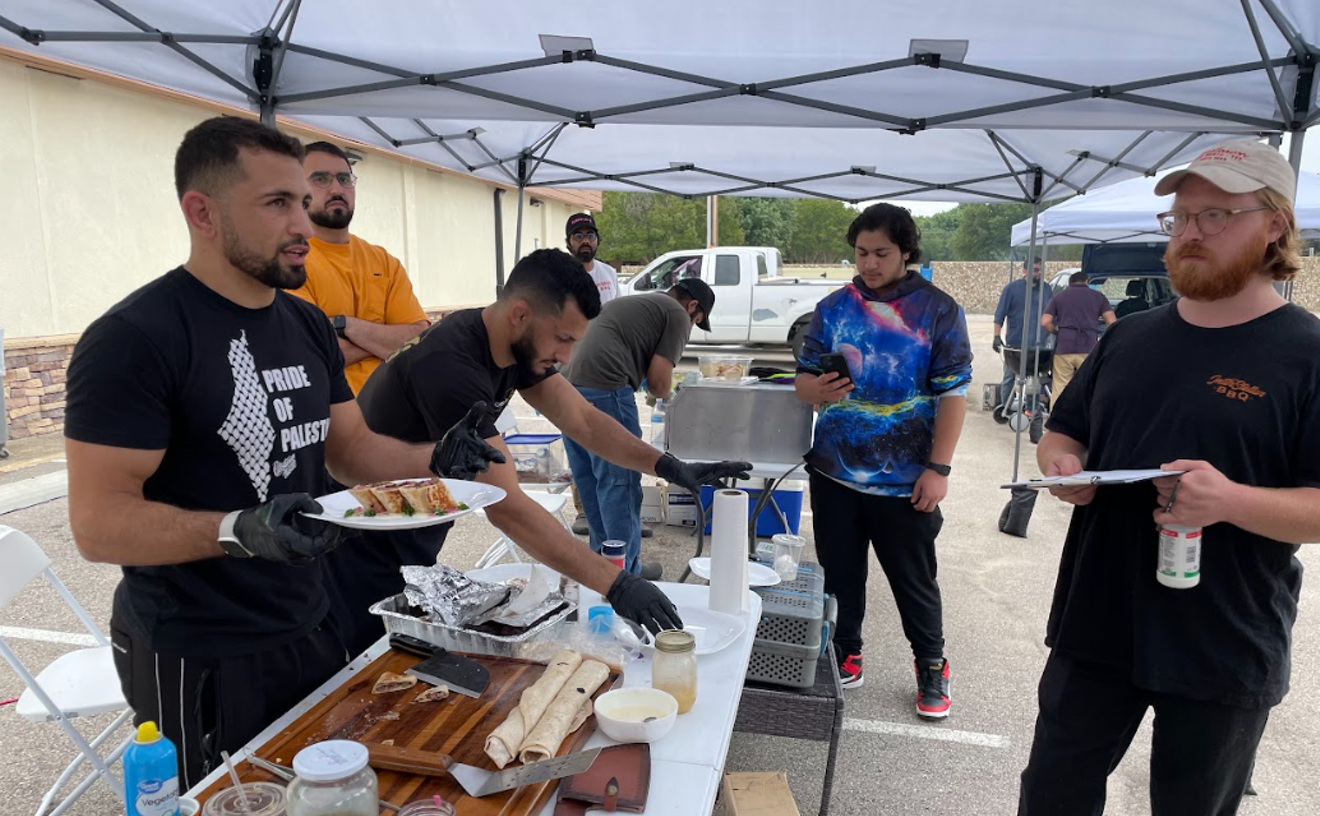"Should I turn on the sign?" Yemi Lemma asks. Months of preparation have led up to the opening of Desta, an Ethiopian spot far up Greenville Avenue, just inside Lyndon B. Johnson Freeway. Co-owner Lemma was well prepared for her first night of business, but still she was nervous. The staff, including her sister Tizeta Getachew, was reassuring. They were ready, they told her.
Lemma drew up a chair, stood on the seat and pulled the tiny chain that illuminated the "Open" sign hanging over one of two doors into the restaurant. Then she pulled the chain that turned on the second. Then the staff waited.
Nearly an hour passed before the first two customers walked in, having no idea that Desta had just reopened amid so much turmoil. It was simply late afternoon, and they were hungry. To Lemma, Getachew and their staff, this was the start of a whole new chapter for their family. "We had a lot of people that evening," Getachew said. "But the next evening it was even busier."
Desta opened the first time in winter 2010. Getachew's brother, Yayehyirad "Yared" Lemma and his wife, Yenenesh "Yenni" Desta, spent months building out the space in a strip mall that previously held a dingy club called the High Point Restaurant. The couple gutted the space, scrubbed what remained and set upon building a sleek dining room of whites and dark wood — all while giving birth to their first child.
Yared and Yenni had worked with contractors before. The couple renovated a house on Marquita Avenue including a sizable addition that would allow a tight-knit family of Ethiopian immigrants to live under one roof.
Getachew immigrated to Dallas from Ethiopia with her mother in 1999. She followed her siblings Yared and Yemi, who both came to the States in the '80s to get an education. After graduating from Baylor with a degree in international relations, Getachew moved back to Dallas to join her family on Marquita Avenue and take a job as an attendant at the Mosaic Family Services Domestic Violence Shelter. Her language skills helped her work with international domestic abuse and human trafficking victims. Soon, she was promoted to director.
Last summer, Getachew moved out of the house to start her own home after getting engaged. "We've always lived together," Getachew said. "It's very typical in Ethiopian culture not to move out until you're married." But just two weeks after moving out on her own, a late-night call sent her hurtling back home to Marquita Avenue.
On August 15, Yared and Yenni hopped into their SUV after closing their restaurant for the night, and drove down Greenville Avenue as a heavy storm began to build. When they got home, Abey Belette Girma, a customer who dined at their restaurant that evening, confronted the couple while they stood on their front porch. Then, according to Dallas police, he shot and killed them both. Girma was arrested that same week in Aurora, Colorado, on capital murder charges. After a three-month extradition battle, he was brought back to Dallas where he currently awaits trail. A witness who tipped off the police said Girma claims the couple "disrespected" him.
The day after the shooting Desta's doors remained locked. The restaurant would stay closed for nearly seven months.
Supporters left flowers and other tributes outside the door, but Getachew says she never saw them because they were too upset to go back to the restaurant. Nearly a month passed before the family could return to take stock of the business. The staff came back as well and helped clear out a refrigerator of rancid vegetables and spoiled meat. They boxed up alcohol and other staples that could be saved.
Getachew says they would have been heartbroken if another restaurateur had taken the space, so while a probate court managed the estate, they worked with the landlord to take over the lease. There were a lot of ups and downs, mainly because aspects of the business were tied up in probate court. There was back rent to pay. "There was so many things," Getachew said. But in late February, after a whole new round of inspections and permits with the city, Desta opened for business again. This time the business operated under a corporation set up by Getachew and her sister under their orphaned nephew's name.
The Spanish Getachew practiced while working at the shelter comes in handy at her new job as a restaurant manager, and she says nearly all of the staff — even the dishwasher — has returned to support the family. Her aunt helps manage the kitchen, watching over the family recipes. Her sister Lema has an MBA, financial resources and an eye for books, so the business aspects of the restaurant are covered. Getachew herself helped her brother open the restaurant and has waited tables in the past, so she knows how to work with customers. She does her best to replace Yenni as a welcoming presence in the dining room. In many ways it's like the restaurant never closed at all.
Desta didn't feel like a typical Ethiopian restaurant when it first opened, and it still doesn't now. The fixtures are modern and minimalist and the space could easily double as a stylish downtown bar. The one-page menu offers a twist on classic Ethiopian cooking.
The doro wat (a braised chicken dish), stewed lentils and tibbs (stewed beef) you'd expect at any Ethiopian restaurant are here, some with updates. The tibbs, for instance, is prepared with tilapia upon request, for Ethiopian Orthodox customers observing Lent. Kifto, typically made with raw beef and butter, are offered with tuna and flavored olive oil for the same reason. Grilled meats come out on sizzling iron plates like fajitas, but there are no tortillas. Injera, the spongy bread that marks most Ethiopian cooking, is abundant as well. The massive rounds of bread aren't used to line plates here, as they are at most Ethiopian restaurants, but it's still cut and passed out to customers in tight little rolls to be used like a utensil for pinching little bits of kifto and scooping up hunks of rich stew.
The restaurant's logo on the menus and on the wall spells out Desta, which means happiness, in Amharic. The word somehow still seems to describe the place. Despite their losses, Getachew describes a family that is filled with anticipation and a sense of purpose, while also admitting that filling in for Yared and Yenni is sometimes difficult. "They were always thinking about what to tackle next to make the restaurant better. I think that that's something that I don't have yet," she said. "But it's always a motivator."
The biggest incentive, of course, is her nephew. He'd visited Desta the weekend before the restaurant opened, as the family was preparing for their final inspection. "He was running around like usual," Getachew said, describing a toddler who perhaps best evokes the restaurant's name. He's 2 years old now — too young to remember the parents who built the business that's now meant to provide for his future.










